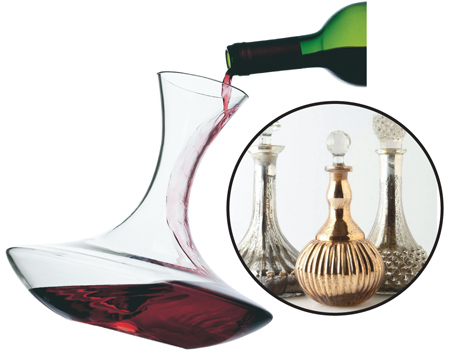 In years past, we have written about a number of gifts for wine lovers. We have talked about books, glasses, education, and wine itself, but one item we haven’t mentioned is the multi-functional decanter.
In years past, we have written about a number of gifts for wine lovers. We have talked about books, glasses, education, and wine itself, but one item we haven’t mentioned is the multi-functional decanter.
By Lou Campoli
 In years past, we have written about a number of gifts for wine lovers. We have talked about books, glasses, education, and wine itself, but one item we haven’t mentioned is the multi-functional decanter.
In years past, we have written about a number of gifts for wine lovers. We have talked about books, glasses, education, and wine itself, but one item we haven’t mentioned is the multi-functional decanter.
Decanter, you say? Why would I use a decanter? Will it add to my enjoyment of wine? Is it necessary to decant a wine before enjoying it? Let’s explore.
In the world of wine, decanting is the transference of a liquid (red wine) from one container (bottle) to another (decanter or carafe). The purpose of decanting wine is to separate the sediment in the bottle from the clear liquid. As wine ages in the bottle, sediment will develop and deposit itself on the bottom or the side of the bottle, depending on how the wine is being stored. If the wine is stored on its side, stand it up for several days before you intend to pour it, so that the sediment can fall to the bottom of the bottle.
When you are ready to serve the wine, uncork the bottle and, holding a light source (e.g., flashlight or candle) under the neck of the bottle, begin pouring the wine into the decanter. When you see the sediment make its way to the neck of the bottle, stop pouring. Your wine in the decanter will be clear and clean.
After you have decanted the wine, it is time to enjoy it. In the case of old wines (over ten years old), you will want to drink the wine almost immediately. Prolonged exposure to air in the decanter will cause these wines to deteriorate fairly quickly.
For wines that are only a few years old, you can leave the wine in the decanter for a couple of hours to “breathe” (allow it to be exposed to air). This exposure to air allows the flavors in the wine to expand and blend together.
If a wine is very young, powerful, and tannic (e.g., cabernet sauvignon or zinfandel), you can use two decanters. Pour the wine into one of them, then pour the wine quickly into the other decanter. Continue doing this back and forth for several minutes. This action will vigorously aerate the wine, allowing the flavors to come together sooner, and soften the harsh tannins.
Take special care with young, unfiltered wines. Unfiltered wines are just that; they have not been filtered before they are bottled. This results in sediment forming almost immediately after bottling. If you see “unfiltered” on the label, be sure to decant the wine using a light source.
One wine that is absolutely necessary to decant is Vintage Port, but you must do it differently. The neck of a Vintage Port bottle is opaque, rendering the light source useless. Instead, pour the Vintage Port into the decanter through a coffee filter. You will be amazed at the amount of “glop” there is in that bottle. Unlike wine, which should not be stored in the decanter, Vintage Port can be kept in the decanter for several days. Of course, in this case, you must choose a decanter that has a stopper to prevent additional air from entering it.
Whether the wine is young or old, use of a decanter will enable you to enjoy it to its fullest.
A few words about the decanter itself. It should be made of clear, non-colored, uncut glass or crystal. This will give you the best possible view of the clarity of the wine. As soon as the decanter is empty, wash it with hot water only. Do not use soap in this process, because soap will leave a film on the inside of the carafe and impart off-flavors to the next wine. As a side note, you should wash your wine glasses the same way.
The choice of decanter is entirely up to you. They come in many sizes and shapes. Some are gorgeous; others are merely utile. The decanter should be large enough to hold a normal bottle of wine (750 ml, 25.4 ounces) with ample additional enough room for aeration of the wine.
Another consideration when determining which decanter to purchase is the price. They can cost from $20 to many $100s, depending on quality and manufacturer (e.g., Riedel). Your local wine shop will usually stock a limited selection of decanters. Stores such as Williams-Sonoma and Bloomingdale’s carry a larger selection.
We wish you and your families the happiest and safest of holiday seasons.















